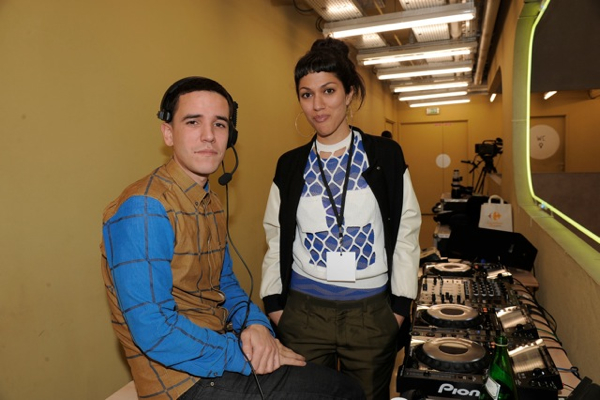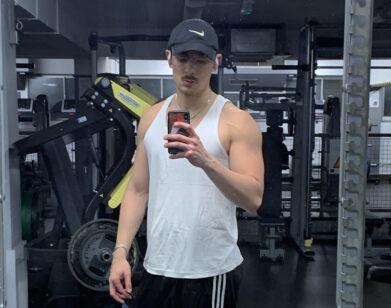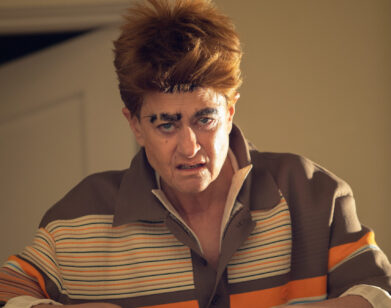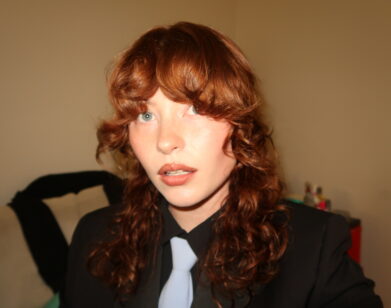Nguzunguzu’s Heart Rate

ABOVE: NGUZUNGUZU’S DANIEL PINEDA (LEFT) AND ASMA MAROOF
Nguzunguzu (pronunciation: en-goo-zoo, twice) live in Los Angeles, but the club mixes, albums, and remixes they create and produce drip with the sounds of the globetrotter. On record, they chop up Latin and African beats with juicy keyboard sounds and small pieces of ’90s R&B vocals to make sublime songs that triumph in instant, chunky gratification. Warm Pulse, their latest release on the label Hippos in Tanks, starts off with a cold shaker sound on the title and opening track, but when the beat comes in, it opens a flood of bass and choral sounds that are both tactile and computer-smooth.
When they DJ at parties, the duo of Asma Maroof and Daniel Pineda use CDJs or flash drives instead of the stereotypical MacBook Pro. They work more remixes into the live experience, fluidly bringing Mariah Carey, Gang Gang Dance, and Rio De Janeiro hyper-beats into the fold. To say that they are “party-starters” is both clichéd and not quite right—because the best time to hear Nguzu DJ is in the middle of the party, when their thick and luscious mixes add a level of sinuous intensity to the club. We emailed back and forth while they were performing at the Unsound Festival in Poland.
ARI SPOOL: Tell us the story of how you met.
ASMA MAROOF: We met in Chicago during the summer of 2006, kind of through mutual friends and MySpace.
DANIEL PINEDA: I was on a road trip, moving from the East Coast to Los Angeles. My friend Jocko and I stopped in Chicago for a week on the way. Asma and I hit it off.
SPOOL: How do you guys collaborate? What would you compare your collaboration process to?
MAROOF: Our collaboration is always different with both our DJ sets and production. We like to switch it up a lot to keep it exciting. I’d compare the process to sex—changing positions, you know?
PINEDA: Ha! Yeah, you gotta change it up and keep it exciting. There are infinite ways to approach a production, whether it be the process of finding sample sounds, or coming to the table with an idea of what you want versus having no idea. Yeah, it’s like sex or an MMA fight.
SPOOL: How do you ensure that your sound is unique? Or does uniqueness not matter to you?
MAROOF: Uniqueness comes naturally if you be yourself and let that come out.
PINEDA: If you really listen to the way things sound and follow your impulses, then your sound will be unique. But there is a history to what what we do and our music is totally inspired by the music we love to play and listen to. We taught ourselves and felt like there were infinite possibilities. I’m not so concerned with uniqueness, but whether the music is boring or exciting.
SPOOL: Do you think there is such thing as a dominant trend in club music anymore? Or was there ever?
MAROOF: Oh no, there definitely still is. Now “trap” is trending, and before it was “moombahton,” or “dubstep.” But you can go find any of these genres now somewhere playing at a club. Hell, you can still find ’80s dance parties or Smiths/Morrissey nights! Music is like fashion in many ways. There will always be the trends, and then the avant-garde shit, but it’s all cyclical. You’re into whatever you’re into, and that is cool.
PINEDA: EDM dominates in a really meta way. Like the Forbes “Top 10 Highest Paid DJs” list.
SPOOL: When you guys play live, I feel like you integrate more vocal samples than you do on record. Am I hearing right? Is there a reason for this?
MAROOF: It’s illegal to release a capellas that are already out in the world but not illegal to use them in sets or mixtapes. We do want to work with more vocalists in the near future, and we are.
PINEDA: We’ve always focused on making instrumental tracks. We’ll use vocals as raw material, and chop it up like a club track. If we use more sampled vocals than that, it’s more like a remix. When we DJ we often play hip hop and R&B tracks with vocals.
SPOOL: How do you decide a track is fit for release on record? It seems like, as live DJs, you are constantly creating material. Do you ever record your live sets?
MAROOF: We do sometimes record them, but not that into doing that. What helps is trying to have a clear and concise theme behind all the tracks.
PINEDA: If its mixed right, it’s sequenced well, it just feels right. We play our tracks for our friends in the car or in the club, and keep tabs on whether they react or not.
SPOOL: Do you believe you exist inside a community of creators? Why or why not? Who is influencing you right now, whether it be with their music, art, fashion, words, or politics?
MAROOF: Oh definitely! That is what keeps me going! Influencers include Beyoncé, Ciara, Ri-ri, Kingdom, Total Freedom, Night Slugs fam, Fatima Al Qadiri, Wu Tsang, Telfar, Venus X, Shayne, Dis Magazine, Kevin Durant…
PINEDA: Mike Q, everybody on Qween Beat, Ghettotekz, DJ Marfox, the list goes on.
WARM PULSE IS OUT NOW. NGUZUNGUZU PLAY THIS WEEKEND AT THE CLUB HELL PARTY AT THE KNOCKDOWN CENTER ON THE BUSHWICK/QUEENS BORDER, WHERE A WAREHOUSE IS BEING TRANSFORMED INTO A “SATANIC MEGA-CLUB” BY THE ART DUO THUNDER HORSE VIDEO.






